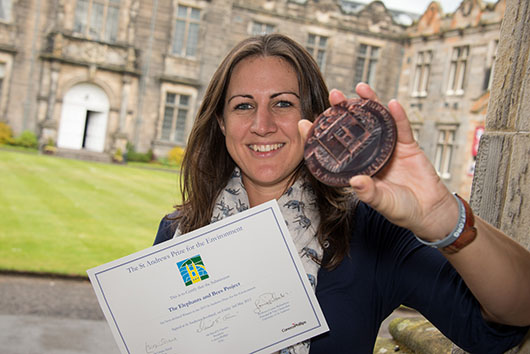The elephants and the bees

This year’s winner, Dr Lucy King.
An innovative project developed from the behavioural discovery that honey bees can be used as a natural deterrent to crop raiding elephants has won this year’s St Andrews Prize for the Environment.
In Kenya, elephants are not confined to national parks and reserves and can pose serious social, political, economic and conservation problems.
Elephants run away from bee sounds and also emit a low frequency rumble, which warns other elephants. This has led to the development and testing of protective beehive fences positioned around farmers’ fields. If an elephant touches a hive, the bees are released. The beehives also provide honey for the farmers.
At a ceremony in the University of St Andrews today (Friday 3 May 2013), Dr Lucy King was presented with the winning prize of US$100,000. Lucy said: “I am delighted with this win. The recognition and financial support will enable us to expand our vital research work and protect many more rural farming families from elephant invasions.”
The St Andrews Prize for the Environment is an environmental initiative by the University of St Andrews, which attracts scholars of international repute and carries out world-class teaching and research, and international exploration and production company ConocoPhillips.
Sir Crispin Tickell, Chairman of the St Andrews Prize for the Environment Trustees, said: “The Prize continues to go from strength to strength. It is now in its fifteenth year and we are delighted that is has become so well established and continues to attract such a range of innovative projects from all over the world. We are looking for entrepreneurs on behalf of the environment, people able to come forward with original, innovative and realistic ideas which can be replicated elsewhere, and take full account of the social and economic implications.”
This year’s runners-up, each presented with a cheque for US$25,000 were:
- CryoDesalination – saltwater desalination by freezing – a process that is environmentally friendly, highly energy efficient, and could provide access to fresh water and improve the lives of millions of people worldwide.
- Transforming lands, transforming lives – using the innovative, simple and cost-effective technology of sandbar cropping in North West Bangladesh to transform lands that have become silted and barren by flooding.
Full details of each of the finalists’ projects can be found at www.thestandrewsprize.com.
Professor Louise Richardson, Principal and Vice-Chancellor of the University of St Andrews commented: “For centuries this University has educated young people motivated by a desire to improve the world around them. We are proud to be at the cutting edge of the field of sustainability and environmental studies and to support, through the St Andrews Prize for the Environment, the current generation of creative thinkers designing solutions to today’s problems.”
“By sponsoring the St Andrews Prize for the Environment, ConocoPhillips is creating a path to a more secure and environmentally conscious energy supply for future generations. This forum lets us recognise groups and individuals with innovative environmental ideas and gives us the opportunity to focus on developing and sustaining their life changing projects,” added David Chenier, President UK for ConocoPhillips.
Since its launch in 1998, the St Andrews Prize for the Environment has attracted entries on topics as diverse as sustainable development in the Amazon and Central American rainforests, urban regeneration, recycling, health and water issues, and renewable energy.
See the full list of previous winners and details about the Prize Trustees at: www.thestandrewsprize.com.
Category Awards